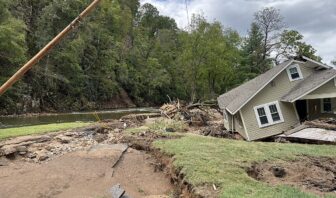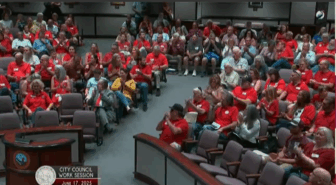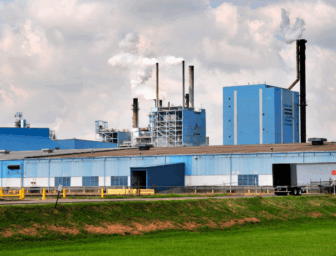FOR IMMEDIATE RELEASE
June 16, 2014
CONTACT:
Kelly Trout, 240-396-2022, kelly@chesapeakeclimate.org
Mike Tidwell, 240-460-5838, mtidwell@chesapeakeclimate.org
‘Stop Cove Point’ Coalition Collects Over 150,000 Public Comments Urging Federal Regulators to Reject LNG Export Plan
Groups warn that FERC is violating federal law by ignoring the project’s significant fracking, climate change and human safety dangers
Recent DOE data illustrates that LNG exports to Asia could help cook the planet, revealing major blind spot in Obama administration climate policy
WASHINGTON, DC — The backlash to a proposed liquefied natural gas (LNG) export facility at Cove Point in southern Maryland reached new levels today, as a coalition of national, regional and community-based groups together amassed more than 150,000 public comments urging federal regulators to reject the project.
Today marks the end of a contested 30-day public comment period on the Federal Energy Regulatory Commission’s draft Environmental Assessment for the controversial $3.8 billion Cove Point plan, proposed by Virginia-based Dominion Resources. FERC’s study has been widely criticized for failing to credibly address the project’s role in speeding fracking across Appalachia, worsening the climate crisis, and threatening the safety of nearby residents in Calvert County with potential explosion and fire catastrophes. Unless FERC substantially revises its insufficient analysis, environmental groups will likely sue the agency for violating the National Environmental Policy Act.
A Department of Energy report released May 29 underlined calls for FERC to conduct a full lifecycle analysis of the greenhouse gas pollution involved in fracking, liquefying, and shipping gas from Cove Point to be burned in Asia. The DOE study, using highly conservative data, illustrates that LNG exports to Asia would almost certainly be worse for the climate than burning coal over the next 20 years.
In all, advocates pointed to the outpouring of citizen comments opposing the Cove Point project — the most FERC has received to date over an LNG export facility — as part of a growing swell of public opposition to the Obama administration’s rubber-stamping of fracking and fracked gas export projects. On July 13, thousands are expected to rally in Washington, D.C. to protest FERC policies that routinely put gas industry interests before the health and safety of people and the climate.
Click here to view the detailed technical comments submitted today by Earthjustice on behalf of groups that have officially intervened in the FERC proceeding.
Statements from groups contributing to the delivery of over 150,000 citizen comments include:
Jocelyn D’Ambrosio, Associate Attorney at Earthjustice: “Dominion’s Cove Point massive fracked gas export project will have a significant impact on the environment and the Federal Energy Regulatory Commission has not adequately addressed these impacts in its environmental review, as required by federal law. FERC was required to address the project’s significant impacts on public health and safety, air quality, the Chesapeake Bay, and on communities that will be subjected to increased gas production in an Environmental Impact Statement. An Environmental Assessment just won’t do. It’s as simple as that.”
Zack Malitz, Campaign Manager at CREDO: “FERC’s logic that we should go ahead and build Cove Point without knowing how much damage it will do to the climate is tantamount to coming upon a poisonous mushroom in a forest, and deciding to eat it because you don’t know exactly how poisonous it is.”
Tracey Eno, founding member of Calvert Citizens for a Healthy Community: “Calvert County residents spoke up in large numbers on this inadequate Environmental Assessment because we don’t trust that Dominion is telling us the truth about the danger to our lives and livelihoods. Dominion omitted the 39,732 people who live in Lusby in its FERC application. They revealed plans to build vapor barrier walls for flammable gas clouds only after FERC required them to be disclosed to the public. As the residents whose lives would be most at risk if there was any sort of accident, we want to be assured that we are safe. We feel it is our right to live in a place that is safe; the proposed project is anything but.”
Deb Nardone, director the Sierra Club’s Beyond Natural Gas campaign: “FERC has the legal obligation to evaluate whether the environmental impacts of an LNG export facility at Cove Point are consistent with the public interest. It is inexcusable for FERC to make that type of determination without first conducting a full environmental review, especially in light of the administration’s position that failure to address the climate crisis amounts to the betrayal of our children and future generations.
Exporting LNG to foreign buyers means more drilling, and more drilling means more fracking, more air and water pollution, and more climate-fueled weather disasters like record fires, droughts, and superstorms. FERC needs to understand the full impact of LNG exports, from drilling and fracking in the US to the potential displacement of clean energy in importing countries. It will then be clear that for the sake of our climate and public health, we need to keep natural gas in the ground and move as quickly as we can to clean energy like wind and solar.”
Jorge Aguilar, southern region director for Food & Water Watch: “FERC’s Environmental Assessment of the Cove Point LNG export facility is a flawed and grossly inadequate review of the potential health and safety threats the facility will pose to Maryland residents and the environment. FERC’s unwillingness to conduct a complete safety risk assessment for the nearby community, its failure to consider the cumulative effects of increased drilling and fracking, and its efforts to curtail public comment reveal that the agency is yielding to pressure from an oil and gas industry desperate to profit from exporting fracked gas to Asia while it can.”
Mike Tidwell, director of the Chesapeake Climate Action Network: “If FERC commissioners put their blinders on yet again, and fail to account for the alarming new data on the climate harm of exporting fracked gas, they will all but prove themselves a broken agency. It’s time for President Obama to shake up FERC, and to stop this routine of rubber-stamping project after project without regard to the health and safety of people or the climate. In the case of Cove Point, the fight is sure to land in the courts, just as it will continue in the streets.”
Kate DeAngelis, Climate and Energy Campaigner at Friends of the Earth: “Exporting liquefied natural gas from Cove Point will be worse for climate change than exporting coal. Allowing this facility to go forward will put the profits of the gas industry above the good of Marylanders.”
Bill Snape, senior counsel with the Center for Biological Diversity: “We cannot solve the global warming problem with more natural gas fracking, more natural gas exports and more natural gas pollution. The proposed Cove Point export terminal takes us backward at the very moment we need positive progress on climate.”
Jesse Bacon, Field Organizer at Environmental Action: “12,600 Environmental Action members know that pipelines anywhere are a bad idea. Many of our members live in states that the pipeline serving Cove Point would run through, and that it would lead to increased fracking that destroy land, water, and air. The only clean energy solution is to leave all dirty fossil fuels in the ground, not ship them overseas.”
Ann Nau, vice president of Myersville Citizens for a Rural Community: “The rush to export natural gas will require a significant amount of new infrastructure, like the toxin-spewing gas compressor that Dominion is now building in Myersville. FERC has a track record of rubber-stamping dangerous projects despite overwhelming opposition from communities and local government. We hope FERC and our elected officials listen to the community concerns this time around and reject the Cove Point facility.”
Fran Teplitz Director, Director of Social Investing & Policy at Green America: “Having conducted only a weak Environmental Assessment of the proposed Cove Point LNG facility, FERC has no grounds for moving forward with this dangerous project. Our nation’s energy future depends on renewable energy and energy efficiency, not gas exports that fuel the climate crisis. Businesses in the Chesapeake region oppose the proposed Cove Point LNG plant and urge FERC to reject this dangerous facility that will not serve our economic interests.”
Joelle Novey, Director of Interfaith Power & Light (DC.MD.NoVA): “Maryland’s religious communities are heartbroken by the harm climate change is already causing to our neighbors, close to home and around the world, and we’re not going to let a Goliath corporation stomp into Maryland and make a mockery of our good work to protect our air, our water, and our climate. We know the comments to FERC we gathered from hundreds of congregations are each small by themselves, but we’re trying to faithfully do what David did: we’re giving this our best shot.”
Betsy Nicholas, director of Waterkeepers Chesapeake: “The water quality impacts to groundwater and the Chesapeake Bay could be disastrous, particularly due to the threats caused by fracking upstream. FERC’s has neglected its duty to protect the public by ignoring these risks.”
Joseph Otis Minott, Esq., Executive Director of the Clean Air Council: “If constructed, Dominion Resources’ proposed Cove Point export facility would ensure the continued expansion of polluting natural gas infrastructure throughout Pennsylvania, further impacting communities that are already struggling for a clean and healthy environment. Now is the time to halt harmful air pollution in our communities at the points of extraction, transportation, and processing of natural gas.”
Rebecca Ruggles, Director of the Maryland Environmental Health Network: “The health impacts for the surrounding Cove Point population are not sufficiently addressed by the EA. We are concerned about the health impact of air emissions from the compressors in the liquefaction process, the possibility of radiation exposure, and the safety risks related to fire and explosion.”
Elisabeth Hoffman of Howard County Climate Change: “FERC’s decisions regarding Dominion’s Cove Point facility threaten to upend all that our members, our state and so many regional groups do to promote clean energy. To approve this facility is to require the fracking, pipelines and compressor stations. The result will be fractured communities, more air and water pollution, and climate-wrecking methane emissions.”
Dr. Gina Angiola, Board Member, Chesapeake Physicians for Social Responsibility: “This is a bad deal for the health of Maryland’s citizens. It is bad for the quality of our air and our water, and it will hurt consumers by causing energy prices to rise. We are especially concerned about locating a natural gas export facility within three miles of a nuclear power plant. The effects of an explosion at Cove Point could potentially be catastrophic.”
Sarah Arnold, Activism Campaign Manager at The Nation: “At The Nation, our readers have often told us that they finish our articles eager to take action on the critical political and social issues that we cover. When our environmental correspondent Mark Hertsgaard reported that the Cove Point liquefied natural gas export facility could lead to a surge of new fracking and had the potential to ‘unleash massive greenhouse gas emissions,’ we knew our readers would want to act. We were right. Thousands of them joined the campaigns, demonstrating that they saw the clear connection between Cove Point and the destructive policies fueling climate change.”
###
Organizations submitting comments to FERC include: Berks Gas Truth, Calvert Citizens for a Healthy Community, Center for Biological Diversity, Citizen Shale, Clean Air Council, Chesapeake Climate Action Network, Chesapeake Physicians for Social Responsibility, Chesapeake Sustainable Business Council, CREDO, Earthjustice, Environmental Action, Food & Water Watch, Forecast the Facts, Friends of the Earth, Greenpeace, Green America, Howard County Climate Change, Interfaith Partners for the Chesapeake, Interfaith Power & Light, Maryland Environmental Health Network, Myersville Citizens for a Rural Community, the Sierra Club, The Nation, Waterkeepers Chesapeake, 350.org.




